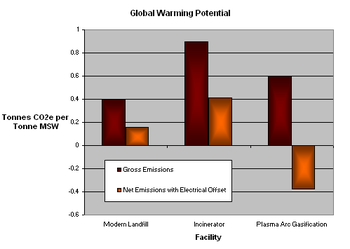 |
| International Recycling Symbol (Photo credit: Wikipedia) |
2. There are social benefits to recycling. Many non-profit organizations have drives to raise money for various causes. Habitat for Humanity for example has a program called Cans for Humanity which raises money to help Habitat for Humanity make quality affordable housing for low-income families. They have locations all around the nation for people to drop off cans.
3. Glass is the easiest and most frequently recycled material. For every 20 glass bottles recycled you will save two pounds of carbon emissions. For every ton of glass recycled that's 700 pounds of saved carbon emissions, or the equivalent of line drying your laundry for six months.
4. The energy savings we see from recycling reduce the greenhouse gas emissions, which in turn affect climate change. If we save 18 million tons of CO2 by recycling in a year, that would be the equivalent of taking five million cars off the road.
 |
| Comparison of greenhouse gas emissions for municipal solid waste disposal methods. (Photo credit: Wikipedia) |
6. If we were to recycle about 50 percent of our waste per day (or just over two pounds), then on average per family we would save 2400 pounds of carbon dioxide emissions per year.
7. Everything you recycle instead of dump in the dumpster saves room in landfills. Large amounts of methane gas are produced at landfills. And these areas can become hazardous, not to mention unsightly.
Recycling definitely has its benefits for the environment - even though it seems like such a small thing! However, it's not all we should be doing. We also need to be much more conscientious consumers. This includes buying products which save energy, and buying products made from recycled materials. Buy green power for your home. Be aware of what you're doing when you travel and think about how you're traveling. Eat healthy, whole, sustainably grown foods - and grow your own organic garden.
Doing all of this will reduce your carbon footprint even more, but recycling is a great start to a life of being green and helping to save the planet for future generations.
No comments:
Post a Comment